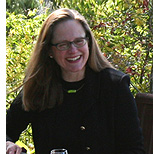Recently, JRW Board Member Robin Farmer had a chance to chat with April Eberhardt. Eberhardt is a self-described “literary change agent” who is not wedded to the old model of publishing. She will share her forward-thinking ideas about agenting at the James River Writers Conference when she joins us this October.
The author advocate founded her own agency in 2011 to assist authors as they navigate the complex and rapidly changing world of publishing. April will take pitches and conduct a short story master class at JRWC13, a conference so “professional, well-run and high quality,” she ranks it among the top meetings for writers nationwide.
Question 1: When you sit down with a new manuscript, what keeps you reading? What makes you stop?
There are three things that make me keep reading and say “this is great.” The first one would be an astonishing concept. The second would be economy of language, and I think the third thing would be an allusion of surprises to come. What makes me put it down would be anything that is too wordy, too meandering, something that doesn’t get off to a very strong start or a concept that, unfortunately, has been written about many times before and just feels too familiar. I spend an inordinate amount of time editing submissions and helping authors, even those I don’t represent. Often times we discover the story really begins on page 45, in which case we cut and paste page 45 and put it on page one. Always start the story off in the strongest way possible, even if that means in the next sentence it needs to be a flashback.
Question 2: What are you looking for during an in-person pitch that differs from an email query?
There is no difference in terms of content. What I look for in in-person pitches is really a sense of the author. Is this someone who understands the business aspect? Is it someone who is passionate about her writing? Is it someone with whom I can forge a long-term relationship, because that is exactly what is required these days, working with an author very closely for a very long period of time. So it’s really more a sense of the person than anything in the pitch itself.
Question 3: How important is it to have a platform to attract an agent?
A platform is most important in nonfiction because in order to be a successful nonfiction author you need to show your readers that you know what you are writing about. For fiction, I don’t really think authors need a platform. Their story is whatever it is going to be. They need to be a passionate, strong writer, but I don’t feel they need any platform in order to succeed.
Question 4: In today’s market, with print-on-demand, e-books, and inexpensive publishing routes, do writers still need literary agents?
I think some do and some don’t. I would suggest that all writers need some sort of guide, coach, or perhaps a publishing consultant. There are some of us as agents who work as publishing consultants, and there are other publishing consultants who are not agents. I would say given the changing times and the wide variety of ways to get published, it’s probably wise for most authors to reach out and try to enlist help of some sort in understanding what their options are, and which one is best for them and their writing.
Question 5: For writers unable to connect with you at writing conferences, how often do you go through your slush pile?
I do look at every one, and I would say 99.9 percent of them I quickly say no to because they are either in genres I don’t represent or I can tell already that the story concept is not unique enough. Or it strays past the genre, and the writing is not distinct enough to be able to stand out in the market. I look at them all, and I respond to them all.
Question 6: You will offer a pre-conference master class on how to create a compelling short story. What are the biggest mistakes writers make with a short story?
Short stories are such a condensed form that they require a different set of writing skills. The mistakes I see most often are that stories are too wordy, too meandering, and too slow-paced. To succeed, a good short story demands an economy of language and a distinct spike to the story. A novel can take long. It has lots of ups and downs. You can vary your pace with a novel because you have more runway. In a short story, it is a sprint. You’ve got to run very fast, very hard and you’ve got to get from a to b quickly and very dramatically.
April Eberhardt is one of four literary agents who will be open for pitches during One-on-One Sessions at the 2013 James River Writers Conference. Stay tuned to our website and future issues of JRW’s Get Your Word On newsletter for details on the other three.


